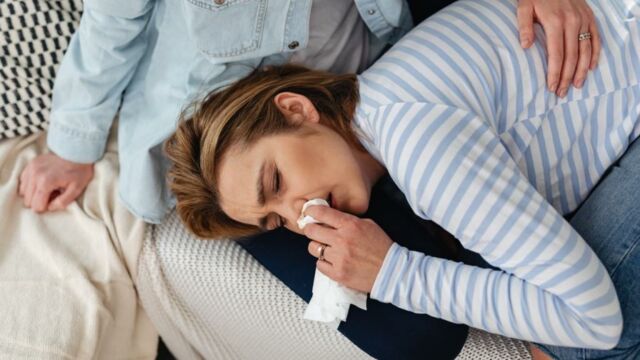If you are suffering from hay fever for the first time this spring, you are not alone, and the doctors believe they know why more people than before get unexpected symptoms such as sniffles, sore eyes and itchy throat.
Discover our latest podcast
Higher levels of pollen in the air than ever before - also known as a 'pollen storm' - have been reported on both sides of the Atlantic and, according to experts, lead to people's immune systems becoming 'overloaded'.
Google Trends data also shows a record-breaking search interest for 'pollen' in the United States alone.
While it is impossible to completely eliminate the trigger during the blooming season, there are successful strategies that help to lower the impact of pollen on your body.
'Pollen storms' are creating entirely new patients
Doctors warn that a growing number of people say they are now being struck down with seasonal allergies for the first time, with the trend having started five-seven years ago.
The new cases are likely being caused by a 'pollen storm' — which is higher levels of pollen in the air than ever before. It leads to people's immune systems becoming 'overloaded.'
Dr Michele Pham, an allergist at the University of California, San Francisco, said:
We've had patients coming to us saying, ‘This hasn't been an issue in the past’. Now, they're getting symptoms, or their allergy symptoms have significantly worsened.'
Britons are bracing for incoming high levels of pollen this week.
— The Mirror (@DailyMirror) April 25, 2023
Forecasters are warning that the pollen count will be extremely high this year. pic.twitter.com/yvm7ByEakT
Allergy season normally starts around late February and early March when the first trees begin to release their pollen. But as climate change triggers warmer temperatures, the sneezing season kicks in earlier and lasts longer.
Scientists also suggest that higher levels of CO2 in the air cause more pollen to be released.
Read more:
⋙ Here's how you can have safe sex even if you're allergic to condoms
⋙ This man has a rare condition that makes him 'allergic to his own orgasm'
Here is how you can protect yourself from the pollen
There are many successful strategies that can help you stop pollen from entering your airways and lower the impact of the blooming on your body.
Hay fever could flare up worse on polluted streets and experts recommend avoiding the eye-watering combination of pollution and pollen.
Dr Adrian Morris, a specialist based at the Surrey Allergy Clinic, said:
The combination of traffic and pollen is bad. So you are probably worse off in the city than in the rural countryside where you would naturally think it would be worse.
Surprising #hayfever tips and treatments allergy sufferers should try - according to health expertshttps://t.co/uT4jseKIhD
— NationalWorld (@NationalWorld) April 19, 2023
Keeping windows shut can also help reduce hay fever symptoms by reducing the amount of pollen that is inhaled.
Vacuum your house regularly and change the clothes you wore outside when you come back home. Shower and wash your hair to remove all the plant particles completely.
Rubbing petroleum jelly around the nostrils creates a barrier and 'traps' pollen before you can breathe it in.
Dr Morris advised:
Take a cotton bud and dip it in some Vaseline and just wipe it around the edge of the nose. That actually can trap some of the pollen grains as they head into your nose.
Doctors also warn those with hay fever against smoking. As well as increasing your risk of cancer, lung disease and heart attacks, it can also make your allergy symptoms more severe.
The chemicals in cigarettes irritate the mucus membrane and exacerbate coughing and an itchy throat.
Taking antihistamines is also a good way to prevent allergic reactions to pollen.
Read more:
⋙ Not cleaning your carpet could have disastrous consequences on your health
⋙ Man who died for 28 minutes reveals his out-of-body experience
Sources used:
- Mail Online: 'Are YOU suffering from allergies for the first time? Doctors say 'pollen storms' are creating entirely new patients'
- Mail Online: 'Got hay fever? Here's your ultimate 2023 survival guide'















